#linguistics tag
Text
Bucchigiri honki shrine decipher and translation
Some time ago I made a post about this tablet, to exalt its coolness as a stylistic mix of arabic and japanese scripts. Upon closer look I noticed it was not random for the aesthetic, but actually real japanese sentences, in an arabic-inspired font!

So I decided to decipher it. It was fun but challenging (especially as a non-native japanese speaker!), but I managed to do it.
japanese and translation:
戦で乱れし世に 逃げぬ心で
In a world disarrayed by war, with a heart that does not flee
鍛錬を積み頂点を目指せ者共あり。
They are the people who accumulate training and aim for the top.
その名を本気人という。
They are called Honki People.
己が身に幾千の武具すら及ぬ力を宿し
Their body possesses power that a thousand armors cannot match.
その拳は火を吹く大筒の如く
Their fist is such as a cannon that spits fire
その蹴りは玉鋼の名刀をも砕いた。
Their kick shattered even the famous tamahagane* swords.
正々堂々 一途な(る?)生き—
A "fair and square", singleminded (way of) life—
民の心を打つも—
They strike even the People's hearts—
*traditional japanese steel made from iron sand and used in swords
BONUS:
This banner from episode 7. Once again japanese, but the katakana part really looks like arabic imo if you didn't know better! very cool
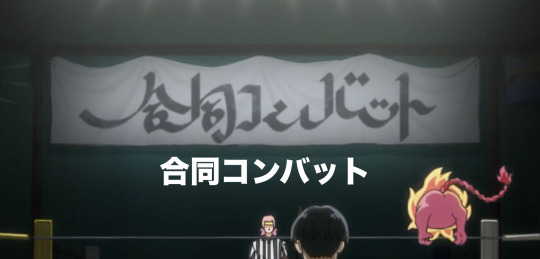
"合同コンバット" (gôdô combatto)
Joint combat
A pun on "合同コンパ" (gôdô compa), "joint party / mixer"; what Arajin thought he was getting into.
#bucchigiri#bucchigiri?!#animanga#anime#linguistics tag#moralgayness#god being familiar with the arabic alphabet only complicated it i was automatically reading 'ت' (t) with those 'で' in the first sentence#and that fucking '一' from '一途' in the penultimate sentence that inexplicably has 2 dots above it?#it was hard to decipher '一途' btw but i noticed the line is higher than the rest of the words which helped me determine it could only be 一#despite the 2 dots.. pretty 😎 of me ngl
82 notes
·
View notes
Text
it's easy to get people to understand that british, american, and australian english all have different pronunciations and vocabulary. they can even understand that within these larger groups, smaller regional differences are common.
it's a bit harder to get them to understand that there's not one "correct" way to speak a language, and that grammar can also change across dialect. english has a couple different standardized forms meant to make communication and education easier, but everyone has their own variation that strays from the standards. it's natural for language to change over time and EVERYONE contributes to this whether they're aware of it or not.
and then, after you explain all this. you have the impossible task of repeating the exact same explanation over again while including mention of AAVE and english pidgins/creoles. because racism legitimately gives people brain damage.

54 notes
·
View notes
Text
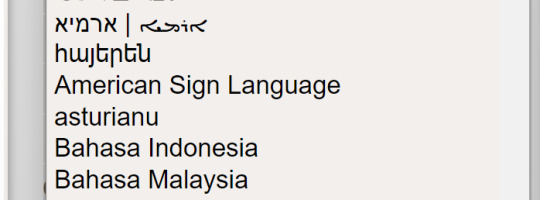
BEGGING someone to explain to me why there is an option to sort for fics in american sign language on ao3
#no but for real#asl#ao3#archive of our own#remi rambles#american sign language#i was like “oh maybe there's a specific kind of english used”#but like#asl doesn't have a written form#like yeah it's a language but it specifically doesn't have a written form because it doesn't need one#it's just the equivalent of that tweet where the person just puts a bunch of emojis and says it's sign language#language#linguistics tag
28 notes
·
View notes
Text
me normally: brainy's voice in the french dub of the 1980s show sucks
me thinking abt "je t'aime infinitivement": brainy in the french dub of the 1980s show is the best thing ever
literallt in an earlier season the french dub changed clumsy saying "i love you" to "je t'aime bien" which has more platonic connotations
then essence of brainy the translators are like. Fuck it. Brainy loves Clumsy. Infinitely. We're not putting a "bien" in here, figure out the connotations yourself.
15 notes
·
View notes
Text
Phoenician Alphabet, The First True Alphabet
Phoenician alphabet, the first true alphabet, the ultimate ancestor of most modern scripts like Greek, Latin, Hebrew and Arabic alphabets. It has 22 letters, all consonants (it's actually an abjad) and written from right-to-left horizontally.

The Phoenician alphabet is a direct descendant of the Proto-Sinaitic alphabet. Developed by the Phoenicians and thanks to their trade especially maritime trade, it spread across West Asia and Mediterranean, making it the most widely used alphabet at that time.
Maybe this is subjective but this alphabet has a big influence, especially two of its derivative variants, Greek and Aramaic. Its simplicity makes it easy to learn and widely adapted. It's the most well-known and valuable heritage of the Phoenicians, thanks to them.
The Greeks modified the Phoenician alphabet, especially by adding vowels, thus creating the Greek alphabet. The Etruscans modified the Greek alphabet (specifically the Euboean Greek alphabet) and creating Etruscan alphabet which is the direct ancestor of Latin alphabet.
The earliest inscriptions of this alphabet date from around the 12th or 11th century BCE. Many come from Byblos, Lebanon and Carthage. This was used to write Phoenician, Punic, Old Aramaic, Ammonite, Moabite, Edomite, Hebrew and Old Arabic.
The use of the Phoenician alphabet proper (the original alphabet, not modified) began to disappear in the 1st century BCE especially after the destruction of Carthage. Derivatives of this alphabet elsewhere at that time were used by many languages.
In the photo I wrote the Phoenician alphabet on paper along with the names of the letters and their transcription. Sorry if the writing seems stiff. Again, thanks to Phoenicians for this.
Taken on Saturday, 24 February, 2024 at 02:37 with Samsung Galaxy A10s.
#sofiaflorina#phoenicians#phoenician alphabet#alphabet#writing system#linguistics#linguistic studies#linguistics tag#historical linguistics#language#languages#history#greek#latin#hebrew#aramaic#arabic#carthage#proto sinaitic#greeks#etruscan#polyglot#polyglots#language learner#language stuff#language learning#langblog#langblr#langbr#language blog
11 notes
·
View notes
Text
youtube
made another video about words that the internet is using wrong 🙏
#tiktok#tumblr#twitter#linguistics tag#hyperfixation#trauma dumping#love bombing#toxic#toxic people#Youtube
11 notes
·
View notes
Text
i love how most arabic dialects took one look at ق (ipa: /q/) and said i'm not pronouncing that, it's a /g/, /ʤ/, /k/, or /ʔ/, take it or leave it
#some gulfers? gulfians? khalaija? khaleejiyyeen? even pronounce it close to غ /ʕ/ and my uncle has a really bad joke about it#anyway i sure hope i got all the ipa symbols right. i mean i think i did. lmk if i missed any alternative ق pronunciations tho!#linguistics tag#<- am i going to finally have a proper tagging system. who knows
3 notes
·
View notes
Text
Please understand I read a sentence in real life two weeks ago and my brain started to parse it as a tree diagram. I don't think I'm ever going to recover from this.
28 notes
·
View notes
Text
so this post by @icebluecyanide greatly brings to attention how the majority of languages in the world don't have gender marking for pronouns, though the list in it is pretty limited. it's understandable not to know these things depending on what languages you speak or are exposed to, and the reblogs (while they do have the spirit) are a bit confused. science education however is my passion so here are some visualizers and clarifications on gender in languages!
first, a look at gender marking in pronouns.
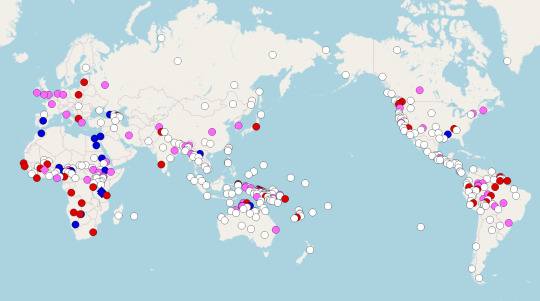
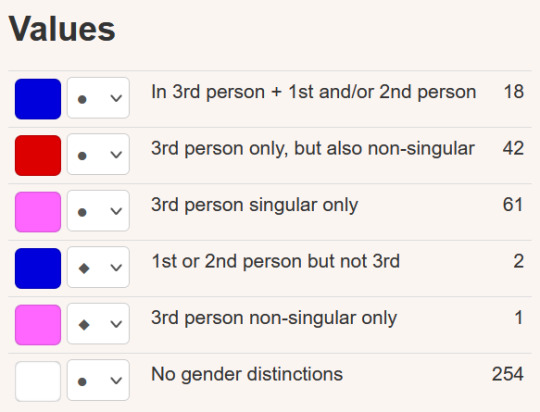
as pointed out in the post, it is uncommon to have gender marking in pronouns - only about 30% of languages do it, while the vast majority of languages omits the distinction. you'd be forgiven for finding this surprising! gender opposition in pronouns is common in european languages, with africa being another prominent area for gender marking. gender distinction in pronouns is usually sex-based (masculine and feminine and sometimes neuter(s)).
next, to address the confusion in the reblogs! the last reblog spoke of number marking in pronouns, or "the amount of subjects". they mention differentiation between two or more subjects (dual-plural) and whether the speaker or listener (or both) are included (inclusivity-exclusivity). grammatical number and clusivity vary in languages, and even more distinctions exist than mentioned! but as they are separate from gender, i won't get into them here.
one reblog by @assuming-dinosaur states that english is "highly unusual among languages in having grammatical gender align so precisely with the social concept of gender". they also mention multiple interrelated phenomena related to noun class/gender systems. clarifications:
languages vary in how grammatical gender/class is assigned to nouns - some languages assign gender solely based on the meaning of the word (e.g. "woman" is feminine), or additionally based on form or pronunciation (e.g. all words ending in "-a" are feminine).
"gender" in linguistics means a system for categorizing nouns, alternatively called "noun class". while these systems can have significant overlap with the social and cultural concepts of gender/sex, as mentioned in the reblog, there are lots of systems whose criteria for noun categorization are unrelated to "natural gender". in addition to sex and pronunciation as factors in assigning grammatical gender, grambank features factors such as shape, animacy and plant-status.
modern english does not, for the most part, have grammatical gender, so it's a bit silly to compare its pronouns to languages with wider-reaching gender systems. as stated above, the masculine/feminine/neuter distinction in pronouns is very common worldwide. and even in english, the alignment isn't 100% precise - e.g. ships and churches may also be referred to as "she".
many languages have a gender system that utilizes multiple factors for noun class assignment. of languages with gender systems in wals's sample, a majority include some sex-based distinction. all non-sex-based systems in the sample were based on some kind of animacy, most often human vs. non-human, or animate vs. inanimate. there's plenty of variation in what is considered animate, though! (in sumerian, for example, humans, gods, and statues (sometimes) were animate, while slaves, among others, were classified as inanimate.)
and yet, after such a long ramble on gender systems, let us remember that languages with gender/noun class systems are in the minority.
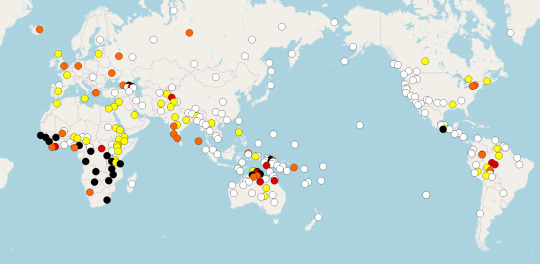
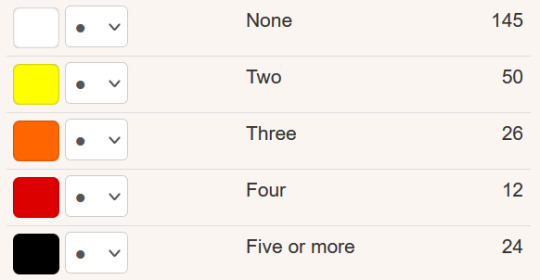
ending on this lovely map demonstrating on one hand how common it is to not have grammatical gender, and on the other, the variety of existing gender systems!
all maps and articles linked here are from wals, the world atlas of language structures, as well as grambank, two wonderful typological databases. wals's language sample size is quite small, but the maps and articles are still very useful and informative for typological comparison. for a larger sample size visit grambank! here's their article on gender in third person pronouns and sex-based noun class systems.
#linguistics#linguistics tag#language#bro i was supposed to go out but instead i spent way too long writing this#some wikipedia links. they do have information that should suffice as a primer if you don't wanna get Into It#text#also to people @d here this isn't a callout lmao just clearing up some things and providing more info
4 notes
·
View notes
Text
My naive brain: OK, I can learn the basics of Croatian myself
Blizu and pokraj: Hello, sweetie😘
#what is the difference#aren’t they both “near”?#Croatian#croatian#croatian language#bertie learns croatian#linguistics tag#linguistics
9 notes
·
View notes
Text
absolutely hate that english broke the annanas streak like what the fuck is a Pine Apple
#LITERALLY EVERY OTHER LANGUAGE#FROME FUCKING FRENCH TO HINDI CALLS A PINEAPPLE SOME VARIATION OF ANNANAS#AND THEN FKN ENGLISH COMES ALONG#GAHHHHH#linguistics tag#language tag#aisha.txt
11 notes
·
View notes
Text
Google save me. Google tell me “disheveled” is pronounced with a “sh” sound and that it’s not “dis-heveled”. Google
54 notes
·
View notes
Note
What language am I speaking in this ask?
Probably English. It's the kind of error I make a lot.
12 notes
·
View notes
Text
you can tell a copywriter is using inclusive language to meet a political correctness standard when it seems like they just found and replaced all instances of the word "slave" to the point where it implies agency and autonomy for people who didn't have it. there is a particularly egregious example of this on the mount vernon website:
In mid-May 1789, Martha Washington, Nelly (10), Washy (8), and seven enslaved people, set off for New York City, the temporary national capital for the new government.
there is a growing tendency to use the phrase in a way where it ends up softening the impact of slavery on human beings rather than amplifying it. to say that they and "seven people they had enslaved" or "seven people they held in slavery" is a mouthful but does a better job of accurately and appropriately describing the situation. frankly the "and" conjunction is doing a lot of the heavy lifting for unfortunate implications here and you could possibly swap it for like, "with" and keep the original phrasing, eg "with seven enslaved people", to avoid the linguistic implication that these seven people willfully chose to embark on this journey rather than were brought against their will.
extremely bothered me when i saw it the other day but i am not sure it's something i could really get in touch about so. to tumblr it goes
important to think about why you are using person centered language and to identify if it is appropriate to use it unmodified in a context or not instead of just using it uncritically, which is the opposite of the point
17 notes
·
View notes
Text
things in various smurfs translations that make me go "I ONLY SPEAK ENGLISH AND I COULD HAVE DONE THIS BETTER"
the "bottle-smurf" mistake in the papercutz english translation of smurf vs smurf
the "smurfar" mistake in the papercutz english translation of the smurfs and the bratty child
NOT FUCKING CAPITALIZING THE "SMURF" IN BRAINY'S NAME IN ONE PANEL IN THE PAPERCUTZ ENGLISH TRANSLATION OF THE SMURFS AND THE BOOK THAT KNOWS EVERYTHING????
the english dub of the 2020s cartoon renaming "dopey" as "dimwitty" and "dreamy" as "dreamer"
each smurf having so many alternate names in spanish because the translators couldnt decide
on the opposite side of the name translating spectrum, the smurfs japanese names just being direct transliterations of their english names
the 80s cartoon japanese dub having brainy use boku (i havent watched the 2020s japanese dub bc if brainy uses boku there i will go feral and insane)
the complete failure of most translations to properly translate sassette's name (they just leave her "sassette" even when smurfette has a different name suffix in that language!!! goddamn it, her name ends in -ette because smurfette's does!)
8 notes
·
View notes
Text
'far out' is used as like a negative exclamation like 'far out! he got stuck in the tree!' but apparently outside of australia it's like surfer slang from the 70s for good things like 'far out! he did a cool backflip!' weird that.
1 note
·
View note